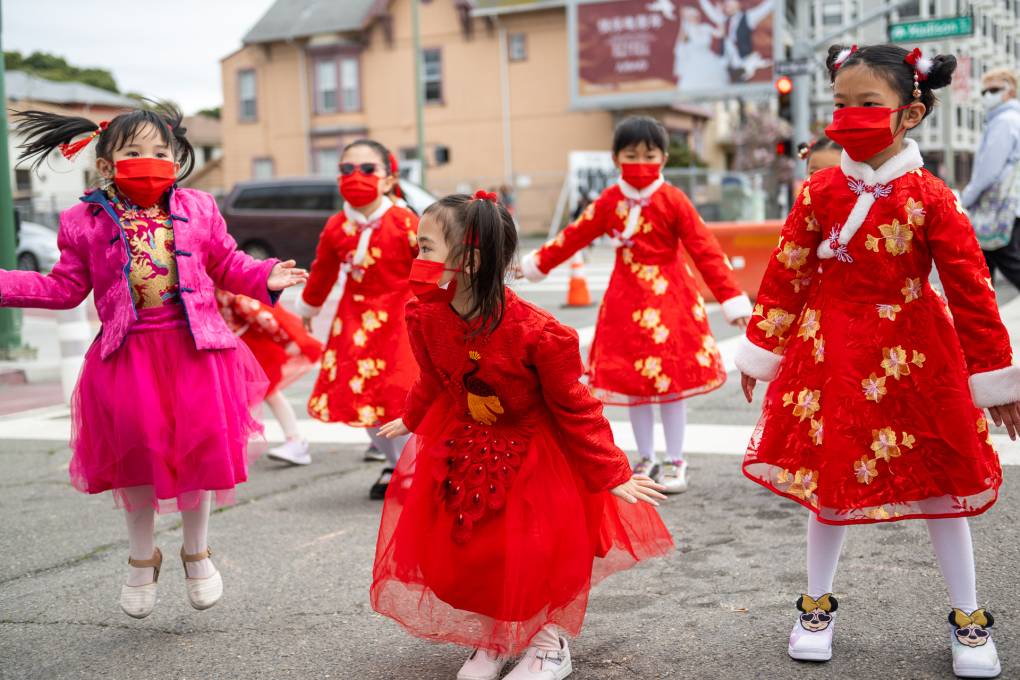
Bay Area residents gathered in Oakland’s Chinatown today for the city’s first Lunar New Year Parade in decades. January 22 marks the start of the Year of the Rabbit (and the Vietnamese Year of the Cat). Hosted by the Oakland Chinatown Improvement Council, the parade comes at a time when community members are hoping to augur a fresh and positive start after the COVID pandemic, a rise in anti-Asian hate since the start of the pandemic, and two recent mass shootings in January that claimed the lives of 18 people in Half Moon Bay and Monterey Park.
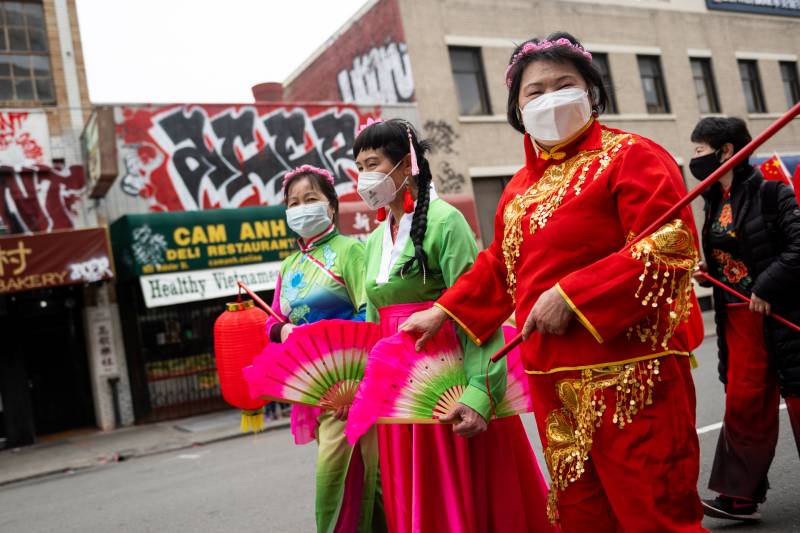 Parade participants make their way through Chinatown during the Lunar New Year parade in Oakland on Jan. 29, 2023. (Beth LaBerge/KQED)
Parade participants make their way through Chinatown during the Lunar New Year parade in Oakland on Jan. 29, 2023. (Beth LaBerge/KQED)

“We have had participants drop out of the parade because of [Monterey Park],” said Stewart Chen, board president of the Oakland Chinatown Improvement Council, in an interview with Ericka Cruz Guevarra, host of KQED’s The Bay podcast. “I think this is important for us to show the rest of the Bay Area and the community and the world that we’re not afraid … It’s a new beginning.”
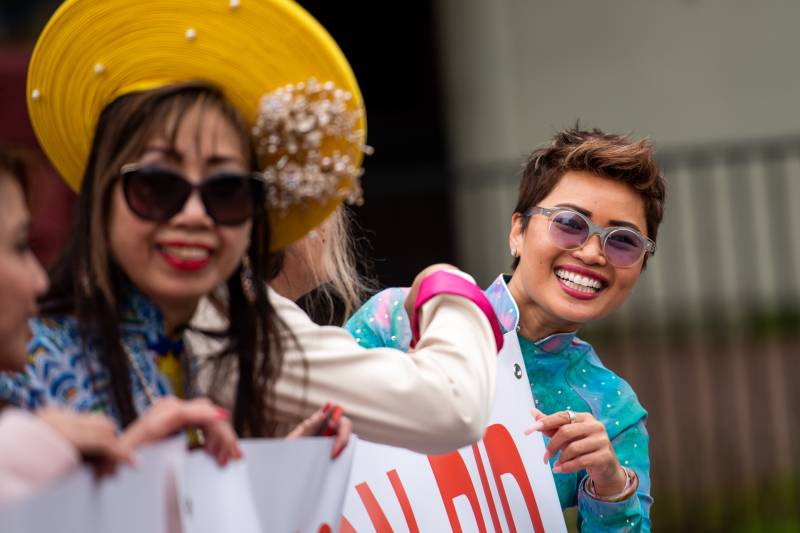 Dr. Jennifer Tran walks with the Little Saigon Business Improvement District group during the Lunar New Year parade in Oakland’s Chinatown neighborhood on Jan. 29, 2023. (Beth LaBerge/KQED)
Dr. Jennifer Tran walks with the Little Saigon Business Improvement District group during the Lunar New Year parade in Oakland’s Chinatown neighborhood on Jan. 29, 2023. (Beth LaBerge/KQED)
“The community is really hungry for celebration [and] hope, and at the same time, this is a theme the same week with the video that was just released for Mr. Tyre Nichols and his family,” said Dr. Jennifer Tran, the executive director of PIVOT, the National Progressive Vietnamese American Organization and president of the Oakland Vietnamese Chamber of Commerce. “And so our hearts are so heavy and we talk about changing the direction and coming together. But what does justice look like for our communities who experience violence? There’s violence in the AAPI community, violence in Latinx communities, violence in the Black communities and for many marginalized communities.”
“For the Lunar New Year, it’s really difficult or actually taboo to talk about a big negative,” she added. “Everything has to be hopeful, but our next direction have to hold those two in tension, right? Both healing and action.”
“I’m originally from Monterey Park, and it’s been really hard hearing from community members down there after many years of staying at home and not being able to come out and celebrate,” said Carline Au. “It’s that sense of fear again and not wanting to go outside and feeling alone. I really wanted to come out today in Oakland to combat that narrative that it’s OK, and that joy and community [are] still out there.”
Themed “Oakland Is Changing,” the inaugural Lunar New Year parade aims to revitalize Oakland’s Chinatown while also celebrating the city’s newly elected Asian American mayor, Sheng Thao. It also comes just a few months after Gov. Gavin Newsom passed a law (PDF) in 2022 formally recognizing Lunar New Year as a public holiday in California.
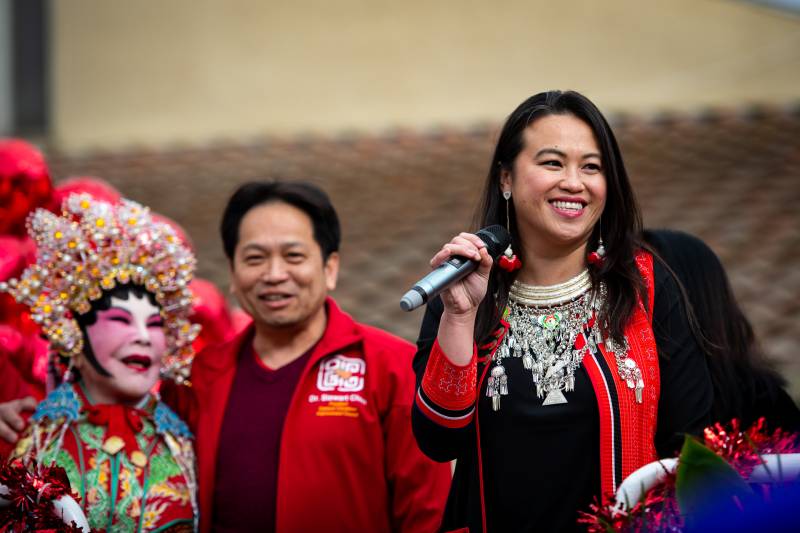 Oakland Mayor Sheng Thao speaks during the Lunar New Year parade in Oakland’s Chinatown neighborhood on Jan. 29, 2023. (Beth LaBerge/KQED)
Oakland Mayor Sheng Thao speaks during the Lunar New Year parade in Oakland’s Chinatown neighborhood on Jan. 29, 2023. (Beth LaBerge/KQED)
“Well, we all know that we are celebrating a new year,” said Oakland Mayor Sheng Thao during the festivities. “We are also celebrating a new way of building community with new leadership.”
“And this is what we’re going to continue to do,” she added. “But we can’t do the work if we don’t actually uplift our seniors and our elders.”
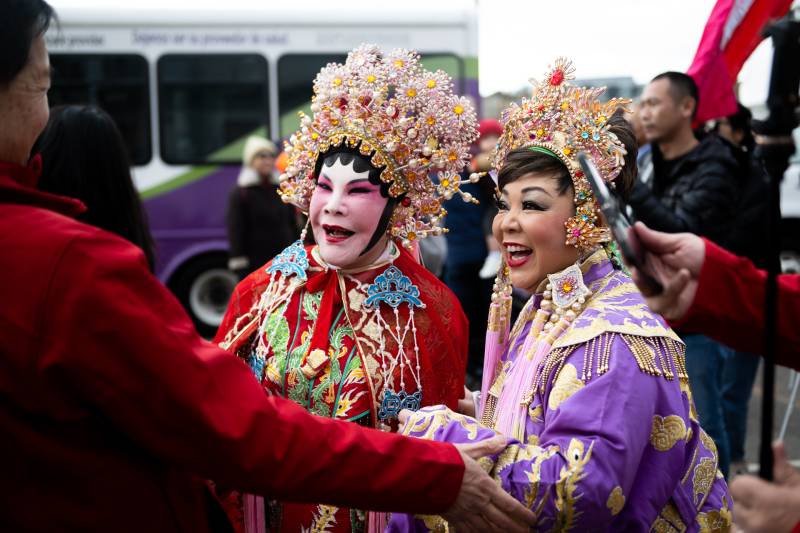 Lana Wong (left), 90, and her daughter Maggie Wong greet friends before the start of the Lunar New Year parade in Oakland’s Chinatown neighborhood on Jan. 29, 2023. (Beth LaBerge/KQED)
Lana Wong (left), 90, and her daughter Maggie Wong greet friends before the start of the Lunar New Year parade in Oakland’s Chinatown neighborhood on Jan. 29, 2023. (Beth LaBerge/KQED)
“It’s really special because the parade hasn’t been here for several decades,” said Becky Luoh, who attended the celebration with her family. “Living in Oakland as an Asian-American family, it’s really special to get to have this tradition and to see the community come together.”
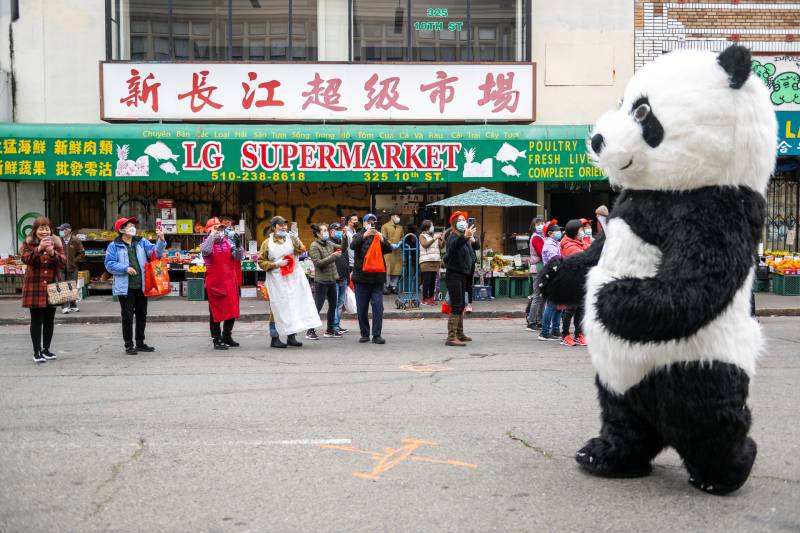 Local employees and spectactors watch as a giant panda walks past during the Lunar New Year parade in Oakland’s Chinatown neighborhood on Jan. 29, 2023. (Beth LaBerge/KQED)
Local employees and spectactors watch as a giant panda walks past during the Lunar New Year parade in Oakland’s Chinatown neighborhood on Jan. 29, 2023. (Beth LaBerge/KQED)
“Especially given all the events of the past week, it’s just really meaningful to get to share it with the next generation,” she added.
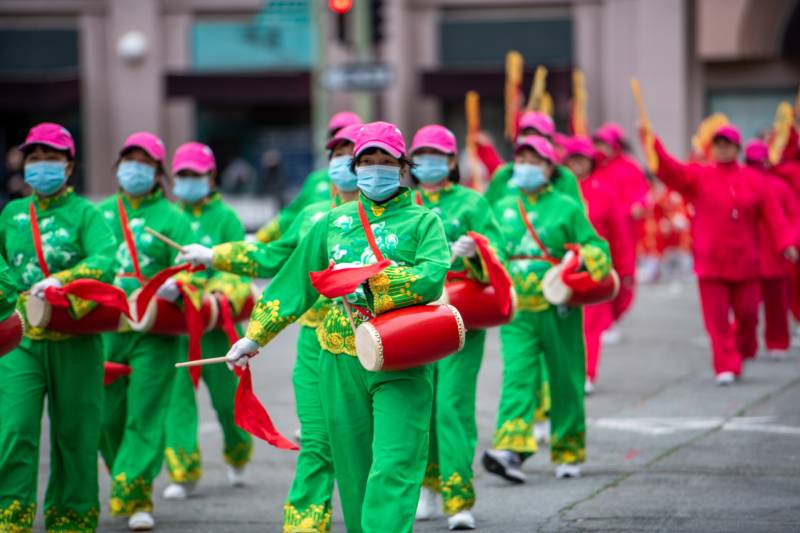 A group performs a waist drum dance followed by traditional fan dancers during the Lunar New Year parade in Oakland’s Chinatown neighborhood on Jan. 29, 2023. (Beth LaBerge/KQED)
A group performs a waist drum dance followed by traditional fan dancers during the Lunar New Year parade in Oakland’s Chinatown neighborhood on Jan. 29, 2023. (Beth LaBerge/KQED)
“[The Lunar New Year parade] is something that I think can unify people because I think we have more in common than we do in difference,” said Vasana Ly, who volunteered with the Oakland Chinatown Improvement Council. “I think with everything that’s going on, we should take every chance we can to celebrate these kind of things.”
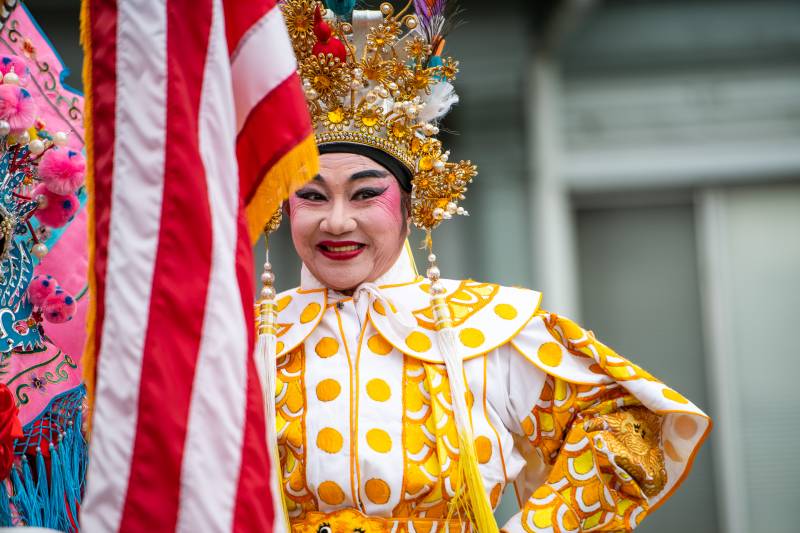 A parade participant stands on a float before the Lunar New Year parade in Oakland’s Chinatown neighborhood on Jan. 29, 2023. (Beth LaBerge/KQED)
A parade participant stands on a float before the Lunar New Year parade in Oakland’s Chinatown neighborhood on Jan. 29, 2023. (Beth LaBerge/KQED)
Hosted by the OCIC and co-hosted by the Toishan Benevolent Association, this year’s parade also commemorated former Alameda County supervisor and California Assemblymember Wilma Chan, an Asian American political trailblazer whose life was tragically cut short in a 2021 traffic accident.
To honor Chan’s legacy, the parade began at the newly renamed Wilma Chan Park by the Lake Merritt BART station, starting 11 a.m., proceeding four blocks down 9th Street, turning onto Webster, and then another four blocks down 10th Street before ending where it began at 1 p.m.
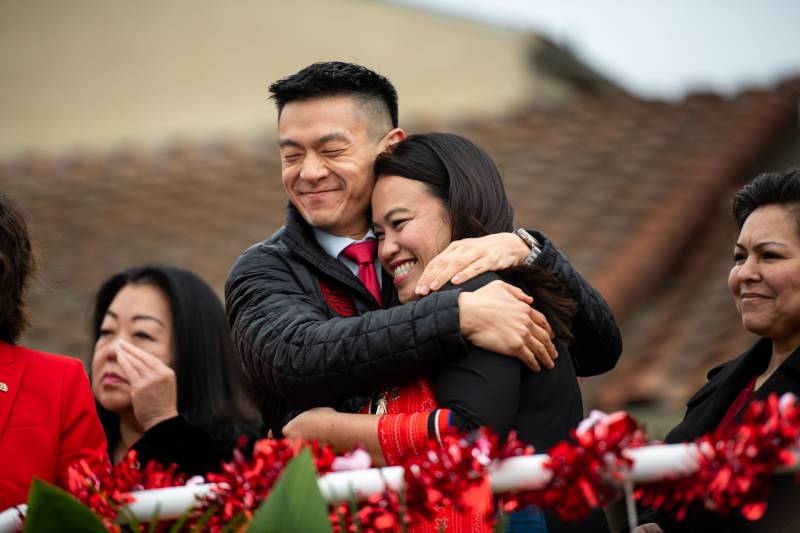 Oakland Mayor Sheng Thao hugs Assemblymember Evan Low during the Lunar New Year parade in Oakland’s Chinatown neighborhood on Jan. 29, 2023. (Beth LaBerge/KQED)
Oakland Mayor Sheng Thao hugs Assemblymember Evan Low during the Lunar New Year parade in Oakland’s Chinatown neighborhood on Jan. 29, 2023. (Beth LaBerge/KQED)
“It’s a time for our community to come together and celebrate this momentous occasion,” said OCIC’s Chen to KQED. “Lunar New Year is now a state holiday. This is a celebration — it’s momentous, it’s historic, and the fear is not going to stop us.”
KQED’s Sara Hossaini, Beth LaBerge and Attila Pelit contributed to this story.






GIPHY App Key not set. Please check settings